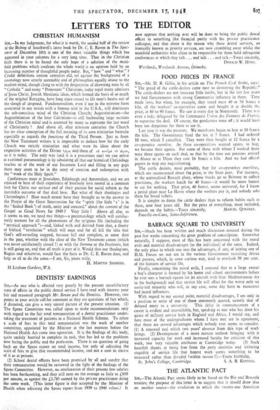FOOD PRICES IN FRANCE
Snt,—Mr. D. R. Gillie, in his article on The French Coal Strike, says: "The greed of the cattle-dealers came near to destroying the Republic." The cattle-dealers are not innocent little lambs, but in the last few years we had Governments with strong Communist influence in them. They made laws, but when, for example, they taxed meat 40 or 50 francs a kilo, all the workers' co-operatives came and bought it at double the price, at 80 to 90 francs. We saw it every day in Normandy. There was even a lady, delegated by the Communist Union des Femmes de France, to supervise the deal. Of course, the gendarmes were off ; it would have been too dangerous for them to see it. Last year it was the potatoes. We merchants began to buy at 10 francs the kilo. The Government fixed the tax at 7 francs. I had ordered. 10 tons, which I cancelled. They were then bought at 12 francs by a co-operative ouvriere. As these co-operatives wanted agents to buy, we became their agents. For some of those with whom I worked there were three agents on each deal, so that by the time our potatoes arrived in Alsace or at Dijon they cost 16 francs a kilo. And we had official papers to stop any requisitioning. The cattle dealers, most probably, buy for co-operatives ouvrieres, which are unconcerned about tit; price, as the State pays. For instance, at the nationalised Renault plant, whose trucks go to Brittany to collect provisions, the workers lunch for 40 francs—it would be more honest to say for nothing. That price, 4.0 francs, seems universal, for I know a petrol plant near Le Havre where the workers pay it, and nobody asks them for bread tickets.
It is simpler to damn the cattle dealers than to reform habits such as. these, now four years old. But the price of everything, meat included,
depends on the habits.—Yours sincerely, MARCEL QUESNEY. Fauville-en-Caux, Seine-Infirieure.


































 Previous page
Previous page